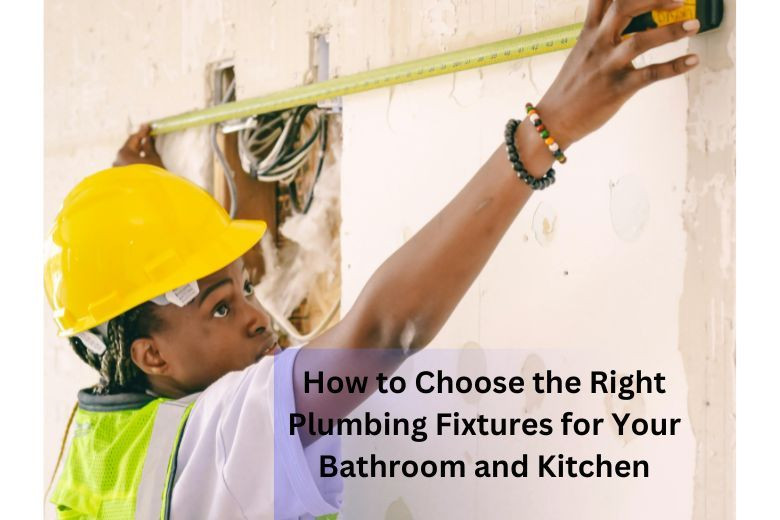How to Choose the Right Plumbing Fixtures for Your Bathroom and Kitchen
Posted on August 01, 2024 by Admin

The correct plumbing fixtures are crucial elements in any bathroom or kitchen, as they include a dose of functionality and aesthetic appeal. Choosing the right fixture from the many options available makes all the difference in space utilization and maximizes it in terms of efficiency. Whether you are selecting fixtures for a renovation or a new installation, consulting a Plumber Service Provider can ensure you make the best choice. Here's a guide on how to pick ideal fixtures for your home:
Must Read : The Role of Electrical Inspections in Home Safety and Maintenance
1. Functionality and Needs
Start with checking on both your bathroom and kitchen needs. Consider the usage to them and what functionality they shall offer. Seek, therefore, a kitchen, faucets that provide decent flow and flexible output to the services intended. You will need bathroom fixtures providing convenience and answering your everyday needs such as adjustable shower heads and toilets with efficient flushing systems.
Tips:
- Kitchen Faucets: Make sure that they are fitted with 'pull-down sprayer' and several 'spray settings' so that you get more flexibility.
- Bathroom Faucets: The faucets shall be fitted with ergonomic controls. Then, you can successfully save gallons of water with a flow restrictor in place.
2. Coordinate the fixtures with Your Design Style
The designs of the fixtures should also complement the overall look in both the bathroom and the kitchen. Be it modern, traditional, or even transitional in design, there are fixtures to go with them. Finishes and styles come into play when considering faucets, showerheads, and other fixtures that will blend cohesively in your space.
Must Read : Top 5 Signs Your Roof Needs Repair or Replacement
Tips:
- Finish: Chrome, brushed nickel, and oil-rubbed bronze all complement your décor.
- Style: Clean lines give this modern feel, while ornate details will bring a traditional feel into a room.
3. Check the Quality and Durability
Be sure to invest in good-quality fixtures so that they may last quite a while and perform up to expectations. Carefully choose those products constructed from hardy materials, like brass or stainless steel, resistant to corrosion and wear. Check for warranties and reviews that prove quality performance.
Tips:
- Materials: This would be solid metal, which, of course, is going to take much better turns toward durability than plastic fixtures are.
- Brand Reputation: Go ahead with brands that build good reputation regarding quality and after-sales service.
Must Read : The Benefits of Regular Roof Maintenance
4. Check Compatibility with Existing Plumbing
Be sure to select fixtures that will work with your existing plumbing setup. Take a measurement of the space where your fixtures are going to be installed. If necessary, consult with a plumber to verify if new fixtures will work with your existing kitchen or bathroom plumbing infrastructure.
Tips:
- Measurements: Measure measurements and requirements carefully with allowance for installation before ordering.
- Professional Advice: Consult a professional plumber as to advice on compatibility and fitting.
5. Water Efficiency
Water efficiency is one of the most important considerations in any modern fixture design. Look for products bearing certifications by organizations like WaterSense. To be labeled with that certification, fixtures must meet specific standards ensuring they save water without diminishing performance. Consulting a Plumber Service Provider can also help you choose the best water-efficient fixtures for your needs. These fixtures not only help reduce utility bills but also contribute to conserving natural resources.
Tips:
– Flow Rate: Faucets and showerheads with a low flow rate save lots of gallons of water.
– Toilets: In their places, dual-flush or low-flush toilets offer better water efficiency when installed.
Faqs
-
1. How do I know a fixture fits with my plumbing?
First, take measurements of the existing plumbing connections that a new fixture is going to be mounted against. Check the size and type of the connections and make sure your new fixture matches these. If it involves complex installations, call a professional plumber who can assess compatibility and make whatever adjustments are necessary.
-
2. Which plumbing fixtures material will ensure durability?
Those made with solid brass or stainless steel can last quite a while. These materials never corrode or wear away easily, like plastics and other poor metals do. The kind of fixtures to select are those based on materials and structure to handle daily uses for years.
-
3. Are the water-efficient fixtures really worth their cost?
Yes, low-flow fixtures are definitely worth an investment. They save gallons of water without compromising on performance and lower utility bills for a much healthier environment. Fixtures bearing the WaterSense certification or other efficiency rating ensure approval for water savings. Water bill savings come in time and could help balance the increased cost upfront for the improved fixtures.
Recent Post
- Top Plumbing Service Providers in Arizona, USA
- Top 10 Electrician Service Providers in Alabama, USA
- Top 20 Roof Repair Service Providers in Alabama, USA
- The Role of Roof Insulation in Energy Efficiency: Tips and Tricks
- Understanding Roof Damage from Wildlife and How to Prevent It
- How to Choose the Best Roofing Contractor for Emergency Repairs
- Roofing Maintenance for Historic Homes: Preserving Architectural Integrity
- The Importance of Proper Attic Ventilation for Roof Health
- How to Identify and Prevent Roof Mold and Mildew
- The Best Practices for Removing Snow from Your Roof